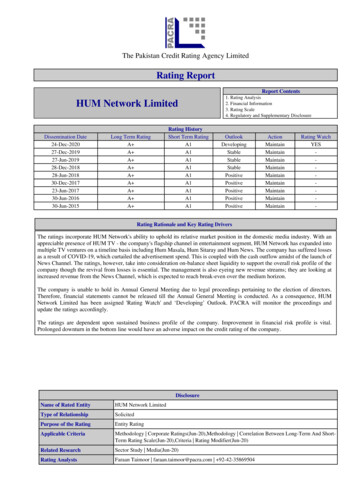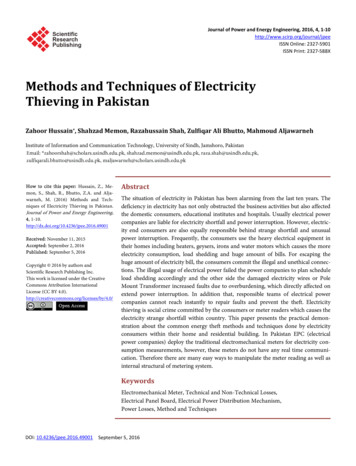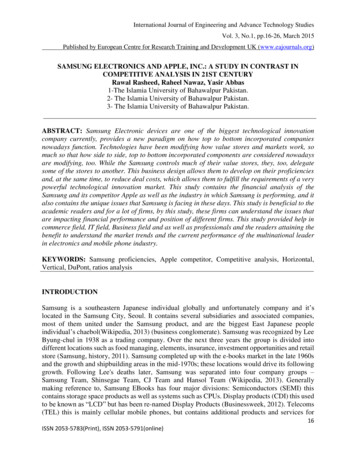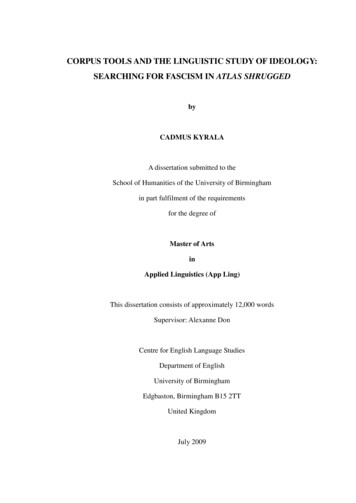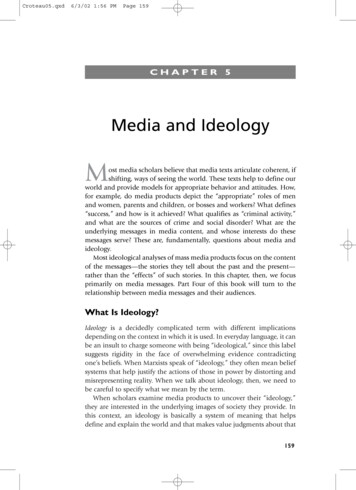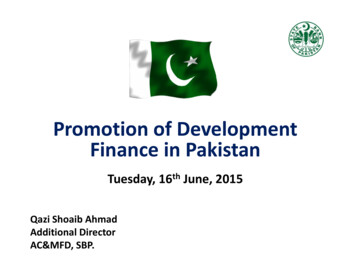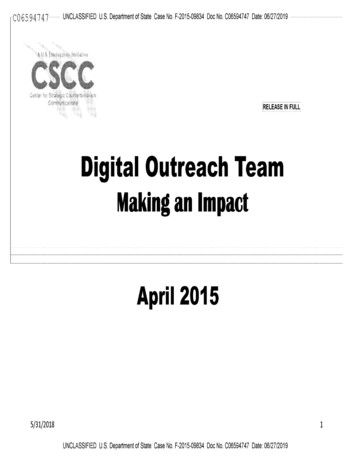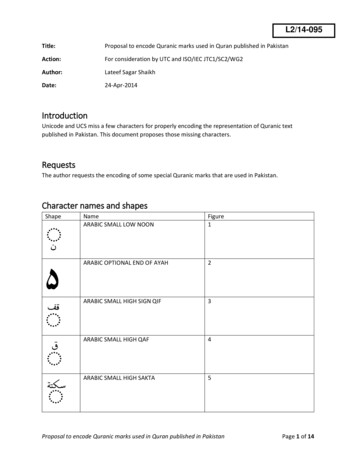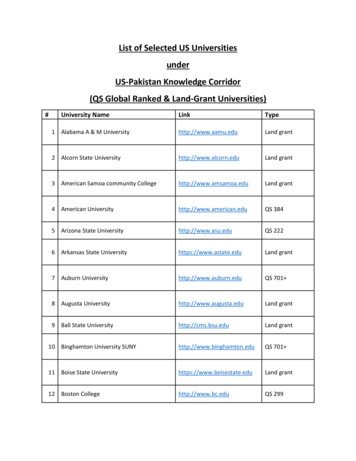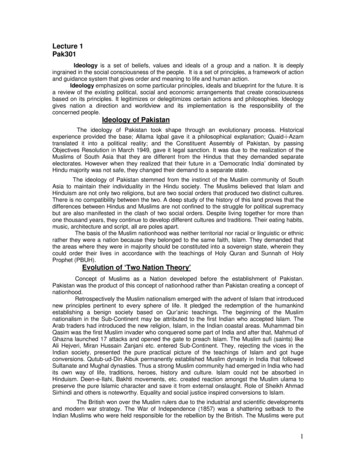
Transcription
Lecture 1Pak301Ideology is a set of beliefs, values and ideals of a group and a nation. It is deeplyingrained in the social consciousness of the people. It is a set of principles, a framework of actionand guidance system that gives order and meaning to life and human action.Ideology emphasizes on some particular principles, ideals and blueprint for the future. It isa review of the existing political, social and economic arrangements that create consciousnessbased on its principles. It legitimizes or delegitimizes certain actions and philosophies. Ideologygives nation a direction and worldview and its implementation is the responsibility of theconcerned people.Ideology of PakistanThe ideology of Pakistan took shape through an evolutionary process. Historicalexperience provided the base; Allama Iqbal gave it a philosophical explanation; Quaid-i-Azamtranslated it into a political reality; and the Constituent Assembly of Pakistan, by passingObjectives Resolution in March 1949, gave it legal sanction. It was due to the realization of theMuslims of South Asia that they are different from the Hindus that they demanded separateelectorates. However when they realized that their future in a ‘Democratic India’ dominated byHindu majority was not safe, they changed their demand to a separate state.The ideology of Pakistan stemmed from the instinct of the Muslim community of SouthAsia to maintain their individuality in the Hindu society. The Muslims believed that Islam andHinduism are not only two religions, but are two social orders that produced two distinct cultures.There is no compatibility between the two. A deep study of the history of this land proves that thedifferences between Hindus and Muslims are not confined to the struggle for political supremacybut are also manifested in the clash of two social orders. Despite living together for more thanone thousand years, they continue to develop different cultures and traditions. Their eating habits,music, architecture and script, all are poles apart.The basis of the Muslim nationhood was neither territorial nor racial or linguistic or ethnicrather they were a nation because they belonged to the same faith, Islam. They demanded thatthe areas where they were in majority should be constituted into a sovereign state, wherein theycould order their lives in accordance with the teachings of Holy Quran and Sunnah of HolyProphet (PBUH).Evolution of ‘Two Nation Theory’Concept of Muslims as a Nation developed before the establishment of Pakistan.Pakistan was the product of this concept of nationhood rather than Pakistan creating a concept ofnationhood.Retrospectively the Muslim nationalism emerged with the advent of Islam that introducednew principles pertinent to every sphere of life. It pledged the redemption of the humankindestablishing a benign society based on Qur’anic teachings. The beginning of the Muslimnationalism in the Sub-Continent may be attributed to the first Indian who accepted Islam. TheArab traders had introduced the new religion, Islam, in the Indian coastal areas. Muhammad binQasim was the first Muslim invader who conquered some part of India and after that, Mahmud ofGhazna launched 17 attacks and opened the gate to preach Islam. The Muslim sufi (saints) likeAli Hejveri, Miran Hussain Zanjani etc. entered Sub-Continent. They, rejecting the vices in theIndian society, presented the pure practical picture of the teachings of Islam and got hugeconversions. Qutub-ud-Din Aibuk permanently established Muslim dynasty in India that followedSultanate and Mughal dynasties. Thus a strong Muslim community had emerged in India who hadits own way of life, traditions, heroes, history and culture. Islam could not be absorbed inHinduism. Deen-e-Ilahi, Bakhti movements, etc. created reaction amongst the Muslim ulama topreserve the pure Islamic character and save it from external onslaught. Role of Sheikh AhmadSirhindi and others is noteworthy. Equality and social justice inspired conversions to Islam.The British won over the Muslim rulers due to the industrial and scientific developmentsand modern war strategy. The War of Independence (1857) was a shattering setback to theIndian Muslims who were held responsible for the rebellion by the British. The Muslims were put1
into the backwardness with the help of Hindus. This was one of the outstanding motivations thatpaved the way to declare the separate identity of nationalism, the Muslim nationalism. TheMuslim scholars sought to reform the teaching of Islamic law and to promote its application in aMuslim society. The prominent name among them is Sir Syed Ahmad Khan (1817-98) whoawakened and guided his community well in time. His educational drive, the Ali-Garh movement,proved to be the best means of social mobility for the Muslim gentry under colonial rule.In 1885 the Indian National Congress was founded to indicate the beginning of the Indiannationalist movement under the British. The Congress worked and helped the British rule. SirSyed advised the Muslims not to join it because, he thought, the Muslims were not in position toinvolve into the anti-government activities. It has been argued that Sir Syed's fear of Hindudomination sowed the seeds for the "Two Nations Theory" later espoused by the All-India MuslimLeague, founded in 1906 and led to its demand for a separate state for the Muslims of India. SirSyed argued that modern education and non-political activities might be the key to Muslimadvancement. The Ali-Garh movement produced educated leadership who could protect theMuslims’ rights on the Western political lines.All India Muslim League had been founded in Dhaka to promote loyalty to the British andto protect and advance the political rights and interests of the Muslims of India. Thus the conceptof ‘separate electorates’ was put forward to dawn a new day for the Indian Muslims.The Two-Nation Theory served as the basis of demand for Pakistan by the Muslims inBritish India. There are two major nations in British India. The Muslims are not a community but anation with a distinctive history, heritage, culture, civilization, and future aspirations.The Muslims wanted to preserve and protect their distinct identity and advance theirinterests in India. They wanted to order their lives in accordance with their ideals and philosophyof life without being overwhelmed by an unsympathetic majority.Initially, they demanded safeguards, constitutional guarantees and a federal system ofgovernment with powers to the provinces for protection and advancement of their heritage,identity and interests. Later, they demanded a separate state when neither the British nor theHindu majority community was willing to offer those guarantees and safeguards.Hindi-Urdu ControversyHindu revivalist movements turned more against the Muslims. Hindu nationalism wasrival to the Muslim nationalism. The Indian nationalism forced Muslims to organize themselvespolitically to defend their interests effectively. After 1857, Hindi-Urdu Controversy was the majorassault by the Hindus on Muslim heritage and legacy of the great Muslim Empire. Hindus werebiased against Urdu as it was the Muslims’ language. They demanded Hindi as the officiallanguage replacing Urdu. There were demonstrations against Urdu by the Hindus in Banaras in1867. It was the start of the Hindi-Urdu controversy. On the very issue, Sir Syed foretold aboutthe unstable future of Hindu-Muslim unity. Hindus struggled vigorously to replace Urdu by Hindi inthe offices. This enhanced the importance of the sense of Muslim separatism.The Muslim nationalism is manifested with the sublime principles to implement like:1. Rule of Law, socio-economic justice, equity and fair play.2. Equality of opportunity to all citizens irrespective of caste, sect, religion or region.3. Religious and Cultural tolerance.4. Respect for human dignity and rights.5.Protection of the rights and interests of non-Muslims and freedom to practice their beliefsand religions.These principles are enshrined in the constitutions. We ought to work towards realization of thesegoals in reality and create institutions and processes that reflect these principles and #########2
Lecture 2Pak301Ideology of Pakistan in the Light of Statements of QUAID-I-AZAMand ALLAMA IQBALThe Development of Muslim Identity and Two-Nation Theory and Quaid-iAzam and Allama IqbalThe sense of nationhood developed among the Muslims before the establishment ofPakistan. Their goal was mostly to protect and promote their identity and interests and shapetheir lives in accord with their ideals and philosophy of life without being overwhelmed by anunsympathetic majority. They adopted the strategy to get constitutional safeguards from theBritish against the cruel majority of Hindus but because of the antagonistic treatment from therivals they set the goal of a separate state. Islam had central place to their further developments.The role of leadership is very important to put nation on the way. A good leadershipinfuses the qualities of awareness, consciousness, mobilization, sense of direction, and defenseagainst the adversaries. The Muslims were lucky having such competent leadership.Muhammad Ali JINNAHM. A. Jinnah was a history-making leader who changed the course of history. Hepossessed a visionary leadership, commitment to the cause and political mobilization capacity.He was a Charismatic Leader in the real sense of the meaning.ROLE OF JINNAHJinnah played a decisive role in articulating the Muslim demands and pursuing thesefaced strong opposition from the Hindus and the British. He started his political career in 1906 byjoining the Indian National Congress. He was elected to the Legislative Council in 1909 and in1913 he also joined the All India Muslim League (AIML). Now he was member of both the politicalparties. Having disagreement with Gandhi on the issue of Swaraj (self-rule), complete freedomfrom the British and on using extra-constitutional means, Jinnah resigned from the Congress in1920.His early efforts to promote Hindu-Muslim unity were materialized when THE LUCKNOWPACT (1916) was signed. The Hindus accepted the Muslim demands: Separate Electorate One-third Seats in Central Legislature protection of minority rightsIn the Nehru Report, the accepted Muslim rights were ignored. Jinnah retaliated forcefully bypresenting 14 Points in 1929.He defined Muslim identity and mobilized them with reference to Islam and convincedothers that Muslims are different from the Hindus and the Congress. Islamic principles, conceptsand symbols surfaced in his speeches and statements.Jinnah used the term NATION for the Muslims of India in Feb 1935 (LegislativeAssembly). He argued that the combination of religion, culture, race, arts, music and so forthmake a minority a SEPARATE ENTITY. In March 1936 Bombay, he stated that the Muslims couldarrive at a settlement with Hindus as TWO Nations. In 1937, he asserted that there is also a thirdparty in India, the Muslims. In 1939, he roared that the Muslims and Hindus are two nations andthey are going to live as a nation and playing part as a nation:We are a nation with our own distinctive culture and civilization,language and literature, names and nomenclature, sense ofvalues and proportion, legal laws and moral code, custom andcalendar, history and tradition, aptitudes and ambitions; in3
short, we have our own distinctive outlook on life and of life. Byall cannons of international law, we are a nation.Speeches and statements: 1940-47Jinnah believed in the force of Islam as he said that Islam is a dynamic force that canunite the Muslims. It can help to overcome the present crisis. It’s a source of inspiration andguidance providing ethical foundation, a framework, social order and civilization.Guidance & inspiration for constitution-making and GovernanceHe also talked of the modern notions of state, constitution, civil and political rights anddemocracy. He assured that constitution of Pakistan would be framed by the elected assembly.Modern democratic and Islamic StateHe gave assurance of equality of all citizens and rights and freedom to religiousminorities in the new state.ALLAMA IQBAL: POET AND PHILOSOPHERVISION OF A SEPARATE MUSLIM STATEMen like Allama Iqbal are born but in centuries. He was conscious of significance ofIslam in lives of the Muslims. His first public appearance was in 1899 at the annual session ofAnjuman Himayat-i-Islam in Lahore when he presented the poem, Nala-i-Yatim.At initial stages Dr Iqbal was a nationalist by ideas and his poetry contained verses likeTarana-i-Hind. His poetry was a critique of the existing societal conditions. Being educated fromEurope, he knew all weak aspects of the Western culture. He criticized capitalism, materialismand lack of spiritualism.IQBAL- Focus on the conditions of the Indian MuslimsIslam can salvage the MuslimsIslam has always saved MuslimIslam is a living and dynamic ideology that canmeet modern challengesIslam to help them to overcome their internaldiscord and enable them to meet external challengesWith spiritualism based derived from IslamIjtehad and Reinterpretation(READ: Reconstruction of Religious Thought in Islam)Address to the Muslim League Session, Allahabad, December 1930I would like to see the Punjab, NWFP, Sind, Balochistanamalgamated into a single state as a self governmentwithin the British empire or without. This is the finaldestiny of the Muslims of N.W. India.(Dr Iqbal’s verses may be quoted) web site may also be visited:http://brain.brain.net.pk/ / wisetech/50/bio/iqbal.htm4
Lecture 3Pak301The Aligarh Movement1858-1902The War of Independence 1857 ended in a disaster for theMuslims. The British believed that the Muslims wereresponsible for the war of 1857 and therefore, they weresubjected to ruthless punishment and merciless revenge.The British had always looked upon the Muslims as theirenemies because they had ousted them from power. Withthe war of 1857 this feeling was intensified and everyattempt was made to ruin and suppress the Muslimsforever. Thus the Mughal rule came to an end and the subcontinent went directly under the British crown.Sir Syed Ahmad Khan made modern education the wayto progressAfter the Muslim rule, the new rulers, the British, implemented a neweducational policy with drastic changes. The policy restricted Arabic,Persian and religious education in schools and made English as the onlymedium of instruction as well as the official language in 1835. A wrongattitude of everything modern and Western, and disinclination to makeuse of the opportunities opening under the new regime was createdamong the Muslims. This tendency, had it continued long, would haveproved disastrous for the Muslim community.Such were the days of despair and despondency when Sir Syed appeared on thehorizon of Muslim India to rescue them. Sir Syed had the conviction that regeneration of theIndian Muslims had not at all visualized that mankind had entered a very important phase of itsexistence, i.e. an era of science and learning which was the source of progress and prosperity forthe British. Therefore, modern education became the pivot of his movement for the regenerationof the Indian Muslims, which brought a complete orientation in their lives. He tried to transformMuslim minds from medieval outlook to amodern one.Hali and Shibli were also associated with theAligarh Movement.Sir Syed’s first and foremostobjective was to modernize the Muslimsfollowing the Western cultural values thatcould create friendly atmosphere for the twocommunities. He motivated his community tolearn the Western philosophy and Englishliterature to get along with the ruling people.Therefore, in order to fulfill this desire hestarted the Aligarh movement. He had twoimmediate objectives in view:1) To remove the state of tension between the Muslims and the Britishgovernment, and2) To induce them to get jobs and other facilities under the new government.5
To him, this was the only way for the Muslims to prosper.The ideals of Sir Syed may be summed up as following:1. To create an atmosphere of mutual understanding betweenthe British government and the Muslims2. To motivate the Muslims to learn Western education3. To persuade Muslims to abstain from agitational politicsFortunately, Syed Ahmad Khan was able to attract a number of sincere friends whoshared his views and helped him. Among them were well-known figures like Nawab Mohsin ulMulk, Nawab Viqar ul Mulk, Hali, Shibli, Nazir Ahmad, Chiragh Ali, Mohammad Hayat, andZakaullah. All these personalities advocated the cause set by Sir Syed Ahmad Khan. SomeEnglish professors like Bech, Morison, Raleigh and Arnold also contributed greatly in building upthe Aligarh college into a first rate institution.Syed Ahmad launched his educational movement by setting up GulshanSchool at Muradabad - 1859; Victoria School at Gazipur in 1863; ScientificSociety for the translation of English works in the native language, Urdu, atAligarh in 1864; Aligarh Institute Gazette imparting information on history - ancient and modern,science of agriculture, natural sciences, physical sciences and Advanced Mathematics in 1866;Committee Striving for the Educational Progress of Muslims - 1870; Mohammedan Anglo-OrientalSchool (MAO) at Aligarh in 1875 at the pattern of English public schools and later raised to thelevel of college in 1877 and university in 1920; Mohammedan Educational Conference (1886),which met every year to take stock of the educational problems of the Muslims and to persuadethem to get modern education and abstain from politics; it later became a political mouthpiece ofthe Indian Muslims and the forerunner of the All India Muslimleague.Besides his prominent role in the educational uplift of theMuslims, Syed Ahmad Khan’s writings played important role inpopularizing the ideals for which the Aligarh stood. His Risala Asbab-i-Baghawat-i-Hind in 1858;and other writings as Loyal Mohammedans of India; Tabyin-ul-Kalam and Khutbat-i-Ahmadiyarooted out the misunderstandings about Islamic teachings and helped create a cordial relationbetween the British Government and the Indian Muslims and also helped to remove themisunderstanding about Islam and Christianity.6
It was this platform from where Syed Ahmad Khan stronglyforbade the Muslims to join the Hindu dominated political party,the Indian National Congress. He regretted the Urdu-HindiPublicationsMovementoftheAligarh controversy initiated by Hindus and predicted that both thenations could no longer live together.He stood for reservedseats for Muslims and also promoted the idea that Hindus andMuslims are two distinct nations, which led to the Two Nation theory.Syed Ahmad Khan’s Aligarh Movement played a significant role to bring about an intellectualrevolution among the Indian Muslims. Thus Aligarh Movement succeeded in achieving its majorobjectives and boosted up the depressed Muslim community to the real status of nation.7
Lecture 4Pak301Sir Syed Ahmad Khan and His ContributionsThe great emancipator of the Indian Muslims Sir Syed Ahmad Khan was born at Delhi in1817. This is the period when the great Mughal Empire was close to a complete collapse. Sir Syed’sfamily had already joined the East India Company and his maternal grandfather served in Iran andBurma under the British government. Sir Syed got interest in English from his maternal family. SMIkram writes, “For this insight into the affairs of the state and first contacts with Western learning andcivilization he was indebted to his maternal grandfather ” (S. M. Ikram, Modern Muslim India, p.18).Sir Syed was very healthy by birth and his grandfather remarked: “A Jat has been born in our family.”(Ibid., p. 19) The death of Sir Syed forced him to join the British as head clerk in 1839. The death ofhis brother made him serious and energetic to face the neuroses of life courageously. Another eventthat changed him entirely was the War of Independence in 1857. In 1841, he passed examination andbecame sub-judge. At the eve of the War of Independence he was performing the duties as sub-judgein Bijnore. He established educational institutions and after coming at Aligarh he rejuvenated hisaspirations to work for the depressed Muslims of the Subcontinent. He devoted his entire life for thispurpose to bring the Muslims close to the British. He died on March 27, 1898 and was buried inAligarh.His ServicesHe took responsibility of the Indian Muslims when they had been thrown in backwardness,depression and humiliation. The British held them criminal of the War while the Hindus had won theBritish being anti-Muslim force. In such environment, Sir Syed guided his community to rejoin the life.To Dr Qalb-i-Abid, “Sir Syed Ahmad Khan was among a very few leaders produced by Muslim India,who like Mohammad Ali Jinnah made a tremendous contribution in guiding the destinies of the IndianMuslims.” (Dr Q. Abid, Muslim Struggle for Independence, p. 11.)Sir Syed and PoliticsIn the political arena, Sir Syed carved numerous successes; he eradicatedmisunderstandings between the Muslims and the British infused due to the past particular incidents.Awakening among the Muslims about the political ups and downs and co-existence in the presence ofother nations in India was another contribution of Sir Syed. He motivated the Muslims to absorb themodern education of the West because this was the very motive of the Western expansion in theworld. He visualized the bright future of the Muslims if they engaged themselves in the Westernlearning.Sir Syed won the British confidence and cordial relationship by saving their lives during theWar of Independence. He utilized this relationship for the betterment of the Muslims. It was a subtlesituation because the government had put the War crimes on the Muslim shoulders and assaultedtheir every aspect of life: “These events were a trauma for the Muslims; the methods used by themshocked the civilised world. The detestation of Delhi as a centre of Muslim culture was horrendous;Bahadur Shah Zafar was exiled to Rangoon; Lt. Hodson shot three Mughal princes and later 24princes were tried and executed; a vast ocean of blood there was; Some Muslims were shot dead andtheir dead bodies were thrown into the river Jamna ” (Ibid., p. 14). All Muslims were ousted fromland, property and employments that made them third class citizens of India. This created revengefulsentiments among the Muslims who detested British, their culture and civilization. Sir Syed was of theview that British were a civilised, educated, wise and disciplined nation and occupied India with thenew war strategy and munitions that could not be matched by the locals and particularly by theMuslims. Therefore at the juncture the Muslims should mould themselves according to the pace oftime to avoid more disaster.Sir Syed published Loyal Mohammedans of India and Risala Asbab-i-Baghawat-i-Hind thathelped both the nations to redress their grievances. In 1885 the Indian National Congress wasfounded but Sir Syed warned the Muslims from the sinister aspirations of the Hindus. Another factorwas that he intended the Muslims to abstain from the politics that could result in friction with the rulingnation.8
Urdu-Hindi ControversyUrdu grew as common language of all the Indians regardless of origin or religion but in1867 the Benarsi Hindus started campaign to replace Urdu by Hindi. To gain the objectives, theydeclared numerous organisations, which discouraged Sir Syed who said to Shakespeare that sincenow both the nations could not live together. Later the followers of Sir Syed tried their level best tosave Urdu language. Mohsin ul Mulk was the outstanding person who organized the Muslims indefence of Urdu.Muslims-as a NationSir Syed used the word ‘nation’ for the Muslims. Some writers criticize that he declaredHindus and Muslims one nation. But as a matter of fact, he advocated the Hindu-Muslim unity thatmeant ‘the working relationship’ between the two nations as once he said: “Hindus and Muslimsshould try to be of one mind in matters which affected their progress.” He favoured separate electoratefor the Muslims in 1883 saying that the majority would override the interests of the minority. (P. Hardy,pp. 136-37)United Indian Patriotic AssociationIn 1888, he set up the Patriotic Association to meet the propaganda of the Congress. Muslims andHindus joined the Association. It advocated the Muslims’ emotions.Muhammadan Defense AssociationIn December 1893, Sir Syed founded the Association. Its main purpose was to protectthe political, religious and social rights of the Muslims.Sir Syed was great because he contributed greatly to the Muslim struggle for identity.Otto von Bismarck served the German nation with the help of all government sources but Sir Syed didthe same without all this. To Khalid Bin Sayeed, “Many tributes have been paid to Sir Sayyid,particularly by modern educated Muslims for being daring enough to put forward such views in an agewhich was by no means liberal or tolerant.” (Dr Khalid Bin Sayeed, Pakistan, the Formative Phase, p.17).9
Lecture 5Pak301MAJOR POLITICAL DEVELOPMENTS 1857-1918The year 1857 brought decline to the Muslim rule in India. Muslims and Hindusparticipated in the War of Independence but the British held only Muslims responsible for therebellion. The Muslims were persecuted ruthlessly and left at the mercy of time. The post war erawas disastrous for the Muslims but some personalities emerged on the national scene and playedexcellent role to guide their people in this critical situation. The Central Mohammedan Associationof Justice Amir Ali Syed and the Aligarh movement are very prominent in this regard. Their effortsfor revival of the self-identity and political positioning in the Indian society enabled them to faceany challenge in the future.Some important issues have already been discussed in the previous lectures. So a briefreference to events in historical context may be given: Decline after the 1857 UprisingSir Syed and his colleagues’ efforts for revivalRemoval of misunderstanding between the Muslims and the BritishEducational movement or acquisition of modern knowledge and EnglishHindi-Urdu Controversy was the issue that unearthed the hatred and enmity of Hinducommunity towards the Muslims.Formation of the Congress was a method to incorporate the Muslims in Hinduism. Itpopularized the agitational politics that Muslims could not afford because they were stillrecovering the past gaps.Hindu Revivalist movements mostly targeted the Muslims that accelerated the pace ofwidening the gulf between the two nations.Events Since the Beginning of 20TH Century1.2.3.4.5.Partition of Bengal, 1905Simla Deputation, 1906Formation of the Muslim League, 1906Changes in the Goals of the Muslim League, 1913Lucknow Pact, 19161: Pratition of Bengal: 1905United Bengal’s area covered 189,000 sq. miles with 80 million populations. Dr AbdulHameed writes in his book, Muslim Separatism in India, that the partition was imperative even ifCurzon had not initiated it. A Lt. Governor had problems in looking after the eastern areas. MainlyMuslim suffered because of the rotten administration by the British. Before 1905, many proposalsof partition of Bengal had been under consideration but Lord Curzon decided to practicalise thisadministrative scheme. East Bengal became incidentally a Muslim majority province having13000000 out of 31000000. West Bengal was a Hindu majority province. Muslims were veryhappy on the partition as this had enabled them to promote their life conditions. It was rightly anopportunity for compensation. The Muslim community supported it strongly but Hindus retaliatedfuriously saying it the division of motherland. The Congress joined the anti-partition movement.They started widespread agitation, violence and boycott of foreign goods. The main reason ofHindu protest was that they had loosened grip over the eastern parts.Annulment of the Partition on 12 December 1911The British government revoked the partition to avoid trouble on the visit of King GeorgeV. The Muslims were disappointed by the government response to the violent strategy of protestsadopted by the Hindus.10
2: The Simla Deputation 1906In fact Simla Deputation was in line with a kind of thinking that was developing amongstthe Muslims during that time i.e. they had certain interests and they must stand up to protect theirrights and unless they do that that objective would not be achieved. The Simla Deputation of1906 was the first systematic attempt on the part of the Muslims to present their demands, to theBritish government and to seek their acceptance. The Simla deputation comprised 35 Muslimsfrom all over India. It was a galaxy of Muslims leaders from all the provinces, from one end ofIndia to the other and it had Muslims of all background. Therefore, when in 1906, this deputationcalled on the Viceroy, it was the most representative Muslim delegation. This delegation was ledby Sir Agha Khan and Nawab Mohsin ul Malik served as a secretary and this delegation met theViceroy in Simla that was why it was called as Simla Deputation. The memorandum which theypresented was a kind of demands which were the uppermost in the minds of the Muslims at thattime. The delegation emphasized that the Muslims should not be viewed simply in numericalterms but they should take into account their historical importance and the kind of contribution theMuslims had made to British India and keeping in view that importance they should work towardsaccommodating their demands. The delegation emphasized that democratic principle should beintroduced keeping in view the peculiar conditions and circumstances of India. The diversity, thefact that there different kinds of people living in India and the fact that the Muslims considerthemselves to be a separate entit
Concept of Muslims as a Nation developed before the establishment of Pakistan. Pakistan was the product of this concept of nationhood rather than Pakistan creating a concept of nationhood. Retrospectively the Muslim nationalism emerged with the advent of Islam that int
